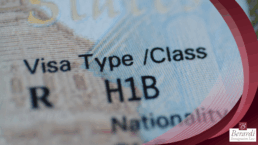Much has been in the media lately about changes to the H‑1B visa program. The H-1B is a professional temporary worker visa available with employer sponsorship for a position that requires at least a bachelor’s degree or higher to fill the role. This long-standing employment visa program was upended by the Presidential Proclamation issued on September 19, which introduced a controversial $100,000 supplemental fee for new H-1B petitions.
This unprecedented measure, purportedly aimed at protecting American workers, has already triggered multiple lawsuits challenging both its legality and scope. Questions are now before the courts regarding the Administration’s authority to impose such a sweeping financial burden through executive action, the unclear parameters of who must pay it, and the potential chilling effect on employers, research institutions, and healthcare providers who rely on global talent to sustain critical operations.
Our team at Berardi Immigration Law is closely monitoring the rollout and litigation that is already underway. Below is a breakdown of what is required, who is impacted, and what strategic steps individuals and businesses should be considering now.
What the $100K Fee Rule Says
Who Must Pay & When
The fee rule via a Presidential Proclamation and supported by USCIS guidance, states:
- The fee applies only to new H-1B petitions filed on or after September 21, 2025.
- The fee is one-time, not annual.
- It applies to beneficiaries outside the U.S. at the time of filing; those already in H-1B status in the U.S. are exempt.
- Employers must submit proof of payment or an approved exception request before filing the petition, or USCIS may deny the petition.
Who Is Exempt or Protected
- Current H-1B visa holders (in the U.S.) based on petitions filed before September 21, 2025 are not subject to the fee.
- Extensions, amendments, change-of-employer petitions for workers already in the U.S. are not subject to the fee under current guidance.
- A “national interest” exception exists: the Secretary of Homeland Security may exempt certain petitions where the worker’s presence is deemed critical to U.S. interests and no U.S. worker is available. However, implementing details are not yet published.
What This Means for Employers & Foreign Nationals
For U.S. Employers Sponsoring H-1B Workers
If you are an employer planning to file a new H-1B petition for a beneficiary outside the U.S., you now need to:
- Confirm whether your petition would fall under one of the narrow exceptions or whether you may delay filing until further clarity is available. Many immigration counsel now advise pausing new filings or exploring alternatives in light of major uncertainty.
- Update internal processes to ensure that the proof of payment is submitted with the petition, since USCIS guidance specifies that petitions lacking the proof will be denied.
- Consider alternative visa categories (e.g., O-1, L-1, TN for Canadians/Mexicans) or employment-based green-card strategies where feasible, given the increased cost and risk.
For Foreign National Workers & Dependents
- If you are already in the U.S. in H-1B status based on a petition filed before September 21, 2025, the new fee does not apply to you. Travel and re-entry risks remain reduced under current guidance.
- If you are outside the U.S. and awaiting a new H-1B petition, or your employer is preparing one, expect significant cost increases and procedural risk.
- If you travel abroad and your employer files a “new” petition for you (which might be treated as outside the U.S. beneficiary), you could fall under the fee regime. Seek legal advice.
- If you have dependents (H-4 status) tied to your H-1B, any delay or denial of the principal petition may impact their status as well.
Open Questions & Risk Areas
Areas Lacking Clarity
- It remains uncertain how “new” is defined in some contexts (for example, change-of-employer petitions, cap-exempt employers) and whether some of those will trigger the fee.
- It is unclear for now whether the fee applies to cap-exempt employers (e.g., universities, research institutions).
- Litigation is already underway challenging the legal authority of the proclamation and fee. Any adverse court ruling could change the policy.
Practical Next Steps H-1B Visas
- Pause new filings: If possible, consider delaying new H-1B petitions for beneficiaries outside the U.S. until the framework is further clarified.
- Review current workforce: Identify foreign nationals currently on H-1B status (in the U.S.) whose petitions were filed before the effective date. These are safe from the fee under current guidance.
- Explore alternatives: For planned hires or transfers, evaluate whether other visa categories or direct employment via remote or local arrangements may mitigate cost and risk.
- Stay informed: Monitor USCIS, DHS, and DOJ announcements, and be prepared to adapt. At Berardi Immigration Law, we will keep you updated as further guidance, regulations or litigation outcomes emerge.
Stay Informed and Aware of H-1B Visa Changes
The $100,000 fee rule marks one of the most significant updates to the H-1B program in recent history. While the guidance from USCIS narrows the scope and provides some relief for existing H-1B holders, the uncertainties and compliance risks remain substantial.
Whether you are an employer planning to sponsor foreign talent or a beneficiary evaluating your visa options, the changes demand early action, careful review of status, and close coordination with immigration counsel. At Berardi Immigration Law, we stand ready to help you navigate this evolving landscape with clarity, confidence and practical guidance.
H-1B Visa Changes FAQ
Does the $100,000 fee apply to my H-1B extension if I’m already in the U.S.?
No. Under current USCIS guidance, extensions, amendments, and change of status applications for beneficiaries already in the U.S. under H-1B are not subject to the fee, provided the underlying petition was filed before September 21, 2025.
My employer filed a new H-1B petition for me (I’m outside the U.S.). Do I have to pay the $100,000?
Possibly. Because the rule applies to new petitions filed on or after September 21, 2025 for beneficiaries outside the U.S., your employer must submit proof of the $100,000 payment unless an exception applies. Consult with immigration counsel to evaluate your specific situation.
Is there an exemption for academic institutions or research organizations from the $100K fee?
No official blanket exemption has been confirmed. While the national interest exception exists, implementing guidance is lacking and cap-exempt employers should proceed with caution and consult counsel.
If you’d like to discuss how these changes affect your specific case, whether employer or foreign national, please feel free to reach out to Berardi Immigration Law for a consultation.
Ready to have Berardi on your side?
Whether you’re a business looking to hire or a professional hoping to relocate, immigration law can be complicated. But you don’t have to do it alone. Put our experience to work for you.



